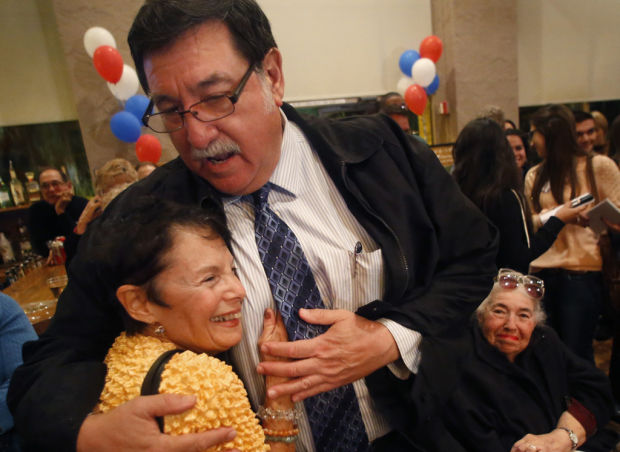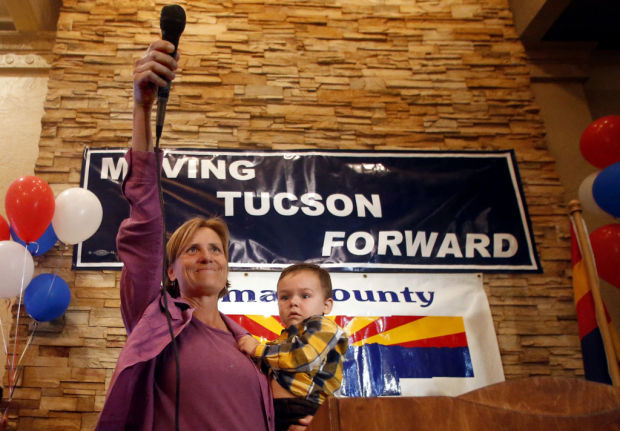Tucsonans voted resoundingly for more of the same this year, electing all three Democratic incumbents to new terms on the City Council.
Voters also overwhelmingly authorized the city to permanently increase its spending capacity by $50 million a year and approved the city’s new 10-year plan.
About 6,000 city ballots still need to be verified by the county recorder and counted, but every city race had a larger margin than that when counting stopped Tuesday night.
All three candidates held up the large margin of each victory as proof residents are enjoying the progress the city has made the past four years.
Ward 3
Incumbent Democrat Karin Uhlich defeated Republican challenger Ben Buehler-Garcia 34,708 to 24,589 for a second time in winning a third term on the council.
“I think people accepted our message. We have been through the worst time since the depression but … we held together and we know what that path is out of there,” Uhlich said at the Democrats’ election-night party at the Riverpark Inn. “I think we have a very promising future.”
This race wasn’t the cliffhanger the two engaged in four years ago, when Uhlich’s seat remained in limbo for three days as election officials tallied ballots before Uhlich could claim a 195 vote victory.
Ward 5
Incumbent Richard Fimbres defeated first-time candidate Republican Mike Polak by about a 60-40 margin to secure a second term.
Fimbres said the vote highlighted how citizens feel about where the city is headed.
“I think with the three of us returning back to the council, it’s a good indication we’ve been doing what the citizens need,” Fimbres said. “Citizens know that we’re trying to improve the quality of life for everybody.”
Ward 6
While the two other victors had to sweat out the vote tallies, Councilman Steve Kozachik left his antacids at home.
Kozachik, a Democrat, ran unopposed in both the primary and general elections for a second term.
Kozachik said the large margins of victory validate what the council has done the past four years and shows voters are tired of the “negativity that has come out of the fringe voices” in Tucson.
Kozachik, who ran as a Republican in 2009, switched parties earlier this year.
Propositions
Voters approved both Propositions 401 and 402 by large margins.
Proposition 401 will allow the city to spend an extra $50 million each year, if it can find the money.
If voters had rejected the higher spending limit, the city would be forced to make cuts to city services as early as 2015.
The city last raised its spending base in 1987 by $46.9 million, which covered city spending needs for the next 25 years.
The passage of Proposition 402 means the city has a new mission statement the state Legislature requires that voters approve every 10 years.
Tucson’s newest plan includes myriad ways the city should grow, preserve the environment and attract new businesses.
While the proposition was contentious during the two-year process, voters approved it by almost 2-to-1.
Mayor Jonathan Rothschild said the two propositions underscore how folks are warming up to what the city is doing.
“I think it shows what we’ve been doing these past years has re-earned the trust with many of the voters in Tucson,” Rothschild said. “And it’s a good sign for the future for us.”
About 29 percent of eligible voters cast a ballot in this election. Historically, turnout over the past five elections involving these three wards — with no mayoral race to draw voters to the polls — has ranged from a low of 16.9 percent in 1993 to a high of 37 percent in 1997.
The city had counted 60,679 ballots by the end of the night Tuesday, with around 6,000 ballots still requiring processing.





